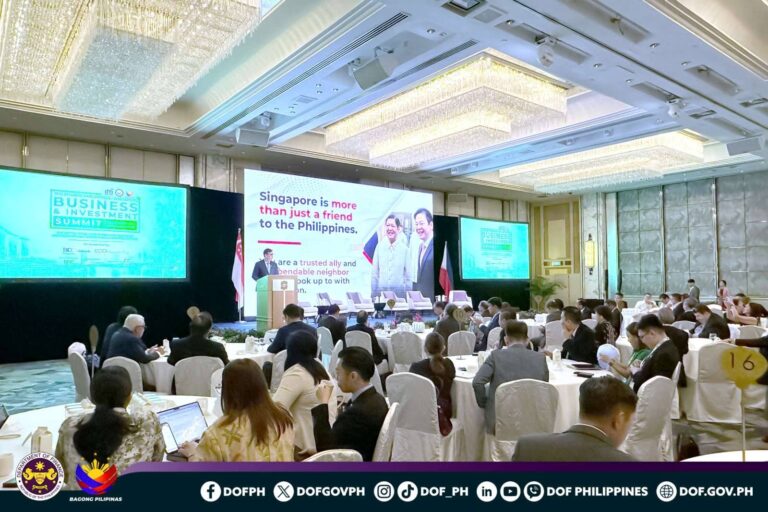Philippine and Chinese officials have underscored the substantial progress made in revitalizing and strengthening economic relations between their two countries, which, they said, was the result of the “favorable and enabling environment” fostered by their continuous efforts to fast-track the implementation of infrastructure projects that the Philippines has presented to China for possible financing.
Philippine officials met last weekend with a visiting Chinese delegation headed by China Commerce Minister Zhong Shan to review the progress of the actions of their respective governments on the first batch of infrastructure projects and discuss in detail the second batch of projects that the Philippines plans to implement also in cooperation with China.
Members of the Philippine Delegation were Secretaries Carlos Dominguez III of the Department of Finance; Ernesto Pernia of the National Economic and Development Authority (NEDA); Mark Villar of the Department of Public Works and Highways (DPWH); Benjamin Diokno of the Department of Budget and Management (DBM) and Arthur Tugade of the Department of Transportation (DOTr); and Vivencio Dizon, President of the Bases Conversion and Development Authority (BCDA).
In step with the two countries’ shared goal of fast-tracking the implementation of infrastructure projects, Dominguez and Zhong acknowledged the efforts of the two sides to streamline government processes to speed up the preparations for, and implementation of, the first “basket” of infra projects presented for Chinese financing.
The first batch, consists of, among others, the Chico River Pump Irrigation Project in Cagayan and Kalinga provinces and the New Centennial Water Source-Kaliwa Dam Project.
The Chinese Government is looking forward to the submission of the second basket of projects being lined up by Philippines for possible funding by China.
Zhong said the two countries should continue to “work closely and productively” and continue the “favorable and enabling environment to improve the efficiency of the work” of the two sides in terms of speeding up the implementation of the Philippines’ infra projects.
Dominguez agreed with Zhong, saying that the “Philippines and Chinese teams should have this shared motto of creating a favorable and enabling environment” among them.
“It is the first time in the history between our two countries that we are working this close and fast together,” Dominguez noted, as he pointed out that at this early stage, potential bidders have already been identified for the Chico Irrigation and Kaliwa Dam projects.
Dominguez and Pernia also informed the Chinese delegation how the Philippine side has streamlined and expedited the approval process for its flagship projects.
Zhong, for his part said: “The Ministry of Commerce will spare no effort to accelerate the construction of all these key projects, and it is our sincere hope these projects can be started at an early date and will be completed at an early date.”
The two sides also cited the progress on the two bridge projects funded by Chinese grants—the Binondo-Intramuros bridge and the Estrella-Pantaleon bridge—that were designed to help ease traffic congestion in Metro Manila.
Underscoring their importance, Dominguez said the two bridge projects “signify the crossing of two friends getting together.”
Zhong likewise said the two bridges “are of very important significance as “these have direct impact on the day-to-day” lives of Metro Manila residents.
Villar said at the meeting that his office and other concerned agencies are undertaking the necessary preparations to meet the target of holding the groundbreaking rites for the two bridge projects by November, in time for the visit to Manila of Chinese Premier Li Keqiang to attend the 20th ASEAN-China Summit.
In the meeting, Zhong reaffirmed China’s commitment to assist the Philippines in rehabilitating conflict-torn Marawi city and the quake-hit province of Surigao del Norte. China earlier sent $1-million in cash aid for Surigao’s quake victims and will soon turn over an additional 20-million renminbi ($3 million) donation of heavy equipment/machineries to help Marawi’s reconstruction efforts.
“China would like to support the Philippines in this post-conflict reconstruction process of Marawi,” Zhong said.
Dominguez thanked and expressed the Philippines’ deep appreciation to China for being the first country to offer its assistance for Marawi and Surigao.
“We appreciate very much the hard work of the (Chinese) Ambassador and the quick response of your government,” Dominguez said.
China will be sending excavators, bulldozer and other heavy equipment to Mindanao to help the Philippine government’s reconstruction efforts in Marawi.
Zhong also reiterated China’s intent to help the Philippines construct two drug rehabilitation centers to assist the Duterte administration’s campaign against illegal drugs and its support for the development of an industrial park as part of the government’s initiatives to distribute the benefits of growth in the countryside.
The two sides have already agreed to enter into a memorandum of understanding on their cooperation in the Philippines’ industrial park development.
Dominguez also cited the rising number of tourist arrivals from China to the Philippines, the increased commercial dealings between the private sectors of the two countries and the people-to-people exchanges that all contribute to cementing their strong bilateral ties.
The Chinese delegation included Chinese Ambassador to Manila Zhao Jianhua, Commerce Vice Minister Wang Shouwen and other key officials of the China Ministry of Commerce and Ministry of Foreign Affairs.





